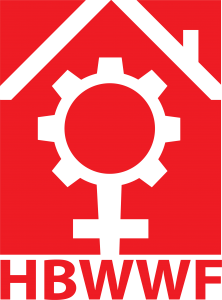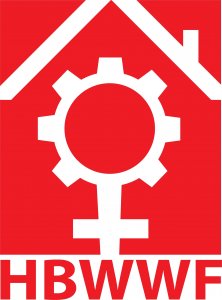MEHNATKASH AURAT RALLY
Emancipation from wage slavery and freedom from economic, social and political exploitation
Manifesto for the International Women’s Day 2023
Introduction
Across many global South countries, the female workforce is exploited economically but also socially. In Pakistan, women’s wages are 34% lower compared to male workers. In fact, women in the informal economy work for longer hours without compensation. Whether it is the right of forming labor unions, collective bargaining, accessing social security benefits, the right to receiving equal wages for equal work, women workers are deprived of their economic and legal rights. These inequalities are particularly stark for home-based workers as their work is deeply entrenched within the boundaries of the household. Most women workers work under difficult conditions as they don’t have access to affordable infrastructural services such as water supply, energy, and housing. Home-based workers’ health is also connected to the kind of work they undertake and conditions in which they work. Pakistan’s current economic crisis has taken a significant toll on the working classes, especially women workers.
Wage slavery is the most visible and oppressive form of capitalism and is experienced largely by women workers, who either work in factories, in homes, in agricultural fields, even in communities as lady health workers.
Wage slavery is an outcome of the production process in which wages are not paid in accordance to the outputs produced, services provided, or when wages are highly unequal and don’t represent the existing expenditure patterns of working classes. A living wage is the fundamental legal right of all workers. It is well documented that capitalism and profit maximisation efforts have led to a growing informal economy as work is shifted from factories to private spaces such as homes. There is, therefore, a need to emancipate women workers from exploitative systems based on the extraction of wealth and class-based inequalities. Gender equality, women’s economic empowerment and their equal participation in the productive economy, politics and policy making are the key pillars for achieving development goals in any society.
Women in Pakistan experience domestic violence, honour killings, forced marriages, conversion, sexual harassment, mental and physical abuse.
Sexual harassment at the work place, harassment by middle-men (or sub contractors) is a key concern for many home-based and factory workers. When working class women leave home for work or education, they are often criticized for what they wear and how they look. Although Pakistan, and Sindh in particular has passed pro-women laws, there is a need to harmonise national laws and other faith-based ideologies that are discriminatory and regressive for women and other marginalised groups including transgenders as well as minority communities. There has also been a rise in violence against children and even transgenders. Women demand safety in homes, streets, neighborhoods, factories, offices and educational institutions.
Rising fuel and food prices, climate change and floods have impacted the working classes through loss of livelihoods, reduced economic opportunities, and increased vulnerability to diseases. Women and children in particular are one of the hardest affected groups and face poor consequences as a result of Pakistan’s harsh economic measures. Slow onset climatic changes such as heat waves affect working hours and energy patterns for those working from home. As millions are affected by extreme poverty and hunger, more working class households are becoming vulnerable to diseases. By and large, our work in the communities has shown that it is working class women who bear the burden of unemployed household members. Women also face the double burden of work managing care and domestic responsibilities as well as their productive work. Given the rise in prices of staple food items, fuel and gas, low income groups can hardly afford a good quality life in the country.
Who Are We
Home Based Women Workers Federation (HBWWF) is a registered trade union that works on advancing economic, civic and political rights of working women specially home-based women workers across Pakistan. Home-based workers often work in extremely poor conditions with repetitive and hazardous work (such as bangle making). Their work hours are usually long, and can lead up to 16 hours with meagre wage rates. At the bottom of the production chain, the workers lack access to and knowledge of the market. Through advocacy work spanning the last two decades, HBWWF has focused on formal recognition of home-based work, setting of legal minimum wages and extension of social security legislations to benefit home-based workers. The federation’s efforts have also focused on making the workers realise their emancipatory potential through organising and collective bargaining.
Our Milestones
- For the first time in Pakistan, unions of women workers were registered and consolidated into an organised platform. Bangle workers union in Hyderabad, and United Garment Workers union, domestic workers unions are amongst the first few unions that got registered with the Labour department. Through these unions, women workers have been able to bargain collectively and negotiate for higher wage rates.
- Baldia Factory Fires Association and the fight against Ali Enterprises
- The passage of the 2018 Sindh Home-Based Workers Act has been one of the major outcomes of successful advocacy by the members of the Home-based Women Workers federation. Subsequently all provinces including Punjab, Balochistan and Khyber Pakhtunkhwa have legally recognised home-based workers through passage of laws. This is an important milestone as for the first time women’s work was officially recognised as formal work even when the workplace is not defined.
- Alongside international unions and networks, HBWWF contributed to drafting an open letter for the European Parliament which demands placement of due diligence mechanisms for all workers in all value chains. It also states that non-judicial enforcement mechanisms should be gender responsive and include worker-designed complaints and grievance mechanisms.
- After consistent lobbying with international groups such as Worker Rights Consortium, Maquila Solidarity Network, and Global Labor Justice-International Labor Rights Forum, Pakistan Accord was passed in December 2022. The Pakistan Accord is a legally enforceable health and safety agreement between unions and fashion brands providing new protections to all garment and textile workers of Pakistan.
- Through long standing advocacy of home-based workers and activists, a law was passed in Germany which holds multinational companies accountable and recognises rights of home-based workers in Pakistan and across the world. A national debate was also started in the European Parliament for legislation on rights of home-based workers
- With registration of the federation, women workers have a platform that raises issues around payment of minimum wages, enforcement of contracts, registration of women workers for social security and other employment benefits with provincial and federal bodies. The federation provides the unions a platform to negotiate for civic and political rights, to make space in the legislature, etc.
- The federation has always shown solidarity with other social movements across the country. In 2007 it joined the lawyers movement, and more recently it supported the movement against eviction drives in Karachi.
- In response to the devastating floods last year, the federation has actively sought out donations and provided relief efforts to flood affected communities in the Sindh province.
- The federation is also working with young people under the Shehri Awami Mahaz & Alternate With the objective of empowering them economically.
- First time in Pakistan’s history HBWWF succeeded in fixing the minimum wage for glass bangle workers which was included in the minimum wage notification gazette in year 2019.
Mehnatkash Aurat Rally 2023
This year along with women workers from across Pakistan, HBWWF will be rallying against the forces of capitalism, class hierarchy, economic oppression and wage slavery. Despite the oppression women workers face, over the past few decades, they have stood up to fight for their rights and resisted against regressive policies and agendas. Women workers have not only been fighting for their own freedom but also for economic and political freedom of the oppressed classes. We strongly believe that the women’s movement has the potential to challenge every anti-women law and customary practices. Although working class women have faced backlash from many actors, they have managed to achieve some key milestones in their struggle. Women from across Pakistan will be celebrating International Women’s Day to demand their rights but also celebrate their work around activism of social and economic justice. This continuous struggle of women workers is playing a role in the shaping of a strong resistance movement in the whole world.
Our Demands
- Abolishment of wage slavery and the right to living wages for all workers
- Women workers should receive decent living wages adjusted according to current prices of basic goods and services.
- End gender-based disparity in wages. Equal wages for equal work is a basic right of all workers.
- Wage rates should be increased in proportion to rising prices.
- Universalization of social security benefits for all women workers
- All workers including home-based workers, domestic workers, haris, agricultural workers, lady health workers, school teachers, and those who work is not officially documented should be registered with social security and pension institutions
- All workers as per Home-based Workers Act 2018 should be registered with the Labour Department to be able to receive social security benefits.
- All forms of contract labor in factories and workplaces should be abolished and all contract workers should be given permanent employment.
- Freedom from sexual harassment at the work place, and within the home
- Factory laws should be implemented and factory employers should provide safety mechanisms for women workers who are unable to lodge harassment related complaints.
- Vigilance committees against harassment should be established in all institutions as per law.
- Subcontractors and middlemen who distribute work to home-based workers should be educated about the 2010 Anti-Harassment Act.
- The right to decent working conditions for all workers irrespective of gender, caste and ethnicity
- All home-based workers should be granted a minimum three month fully paid maternity leave as per the Maternity and Paternity Leave Act 2020 passed by the Govt of Pakistan.
- Day care facilities at workplaces with female workforce should be mandatory
- Maximum working hours should be eight hours a day and workers should not be forced to work on holidays
- The right to affordable basic services such as affordable housing, free healthcare, water and sanitation facilities for all workers
- Demolition of old settlements including those belonging to laborers in the name of development should be stopped. People must not be made homeless.
- High cost of electricity, water and gas has made everyday life economically unaffordable for majority of home-based workers who work within the boundaries of the their homes. It is crucial that electricity and water crisis be solved, and these become affordable for all workers regardless of their geographical location.
- Gender equality and freedom from economic oppression
- Abolish all laws that discriminatory to the rights of women
- Law enforcement agencies should be at the forefront for defending women’s rights.
- Women should be given representation in elected forums in proportion of their population percentage.
- The tribal and feudal systems that have enslaved the women for centuries should be annulled.
- Women’s movements should show solidarity with the working class women’s struggles as freedom of society as a whole is linked to women’s economic freedom
Come join us at the Mehnatkash Aurat Rally 2023, where women workers will demand for “Emancipation from wage slavery and freedom from economic, social and political exploitation.” Like previous years, women workers and organizers pledge to continue their struggle against gender discrimination based on race, religion, caste and creed.
Location: The rally will march from Fuwara Chowk to the Arts Council.
Time: 03:00 PM
Who will attend: Besides thousands of women workers, Haris and women home-based workers, a large number of female students, transgenders and other workers would attend the rally. Please join us and show solidarity towards the everyday struggle of the working classes.


